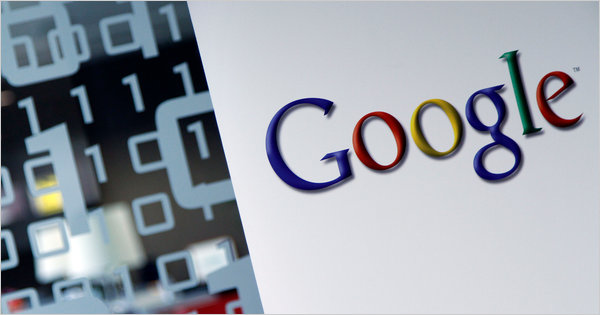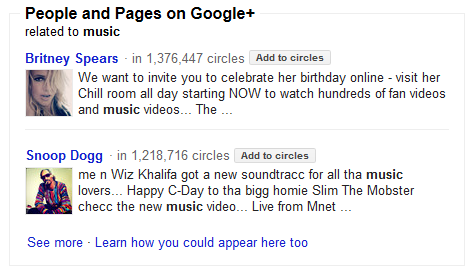Google+ Now Integrated With Google’s Search Results
Google went live yesterday with its latest search enhancement, Search plus Your World, a feature which introduces a more personal element to your search results. Now when you conduct a search, Google blends publicly shared Google+ content with the ordinary search results. This more stratified approach to search represents not only one of the biggest modifications Google has ever made to its engine but also the most comprehensive example yet of how its nascent social network – Google+ – stands to benefit from its integration with the Google ecosystem.
For starters, this feature only applies to those who have a Google+ account and are signed in, and for those disgruntled users who prefer the non-personal search results, you can disable Search plus Your World globally (read: completely) by heading over to your Search settings and selecting Do not use personal results. You can also toggle your personal results on/off on a per-search basis by clicking the Hide personal results button which now appears above the search results.
The primary value of this new feature is that Google now surfaces any content relevant to your search that is publicly shared by your Google+ connections, allowing you to see all the information your contacts have produced on a certain topic. For example, if you search the keyword motorcycle, you will see posts those in your Google+ circles have made about motorcycles, motorcycle photos they have posted on Google+ or Picasa, and even external, non-Google affiliated blog posts they have made about motorcycles. This last element is the crux that separates Search plus Your World from the search you can already make from the main Google+ search bar (which only returns content posted on Google+).
To enlarge this circle of discovery, Google will also include personal results from several websites that are not part of the Google ecosystem, as long as the related accounts are connected to your public Google+ profile. For example, if you have a Flickr, FriendFeed, Quora, or LiveJournal account, or a blog by WordPress or Blogger, those photos, posts, etc. will appear in your friends’ related search results, even if they were not posted on Google+. This can mean greater exposure for those who seek it and it also allows your Google+ connections to see content you contributed prior to joining Google+.
To see which web accounts you have made public, navigate to the About page on your Google+ profile and look under Other Profiles. The list that appears here should match the profiles listed here. Note that Facebook and Twitter are not as comprehensively integrated as those mentioned above (more on that later).
Generic queries like music or science will now commonly return “Featured” profiles and pages of those you are not directly connected with on Google+. These results will be positioned to the right of the primary results, where ads are typically located. A search for music, for example, currently returns Britney Spears and Snoop Dogg’s profiles, two of the most circled people on Google+.
Personal search has also made its way into Google Instant, Google’s designation for the autocomplete feature of its search. With personal results enabled, when you begin typing a contact’s name, their Google+ profile will appear if you are connected with them through the network.
Privacy Concerns
As with any social media change released into the wild, users inevitably want to know how it impacts their privacy. Your personalized results are just that: no two users will see the same information, as the results are tailored to your connections and activity. With Search plus Your World, Google’s results only display publicly shared information, which represents information that’s already available to everyone on the web. This means your private photos and posts will not show up in a stranger’s search results, nor will they be exposed to anyone who couldn’t already see them.
Anything you make public may show up in the search results of those in your circles, and its position is determined by how popular the post was (quantity of +1s, comments, shares) relative to other people in your circles who shared similarly relevant content. If the content exists outside of Google+, such as a blog, it will be ranked according to the usual Google PageRank system.
Lastly, any posts you have shared with specific people, and vice versa, will show up in your respective results but no one else’s.
Is Google Prioritizing Its Own Social Network?
Many tech bloggers have rhapsodized about this game-changing feature, asserting that it unduly favors Google’s own service. Some have even invoked antitrust allegations reminiscent of the Internet Explorer v. Netscape lawsuit brought against Microsoft in the late 1990s. Upon a cursory examination, it might appear these claims hold some currency, as Search plus Your World results do not reflect Facebook and Twitter posts, only those made by your Google+ connections. More explicitly, searching a cooking recipe with this feature enabled, for example, will retrieve posts from those you have connected with on Google+ but not from direct competitors Facebook or Twitter.
Yet Facebook’s and Twitter’s agreements with search engines specify exactly which content is indexed and which content is not. Twitter previously made an agreement with both Google and Microsoft that allowed them to index their public updates in real-time through a special feed. But that agreement expired back in July, and Twitter chose not to renew with Google, only with Microsoft. Bing’s real-time search is still active, while Google has since shutdown their RealTime service, though some of its functionality appears to have been integrated with Search plus Your World.
Facebook, on the other hand, has never allowed Google to fully index its site, and such language is present in their terms of service. Facebook signed a temporary real-time agreement with Google a couple years ago, which stipulated the indexing of public profile and fan pages only. This deal ended the same time as Twitter’s when Google shut down RealTime search. As a result, public status updates, photos, etc. are still not indexed and thus won’t surface in personal search.
Facebook has repeatedly chosen to ally more closely with Microsoft. Their deal gives Bing expanded access to its sitelinks and allows much deeper indexing, resulting in a much more cohesive synthesis between Facebook and Microsoft’s search engine than with Facebook and Google’s.
The lack of transparency and openness between Google and Facebook is nothing new. Perhaps the catalyst for this mutual recalcitrance can be traced to the impending battle for the social web and competitive concerns over Google eventually forming its own social network. In that case, Facebook turned out to be right, but Google has done it without unrestricted access to Facebook’s depository.
At this point, due to Facebook’s recent settlement with the FTC over its privacy practices, it’s highly doubtful Zuckerburg and Co. will allow more information to be indexed, preferring to adopt a “less is more” stance toward search engine crawlers.
Few websites require these collaborative arrangements. Simply embedding the short HTML snippet rel=nofollow in your site’s source code tells Google to exclude your site’s hyperlinks from its PageRank algorithms. For websites with more complicated APIs and data streams, such as Facebook, Twitter and FriendFeed, special agreements are often needed for Google to index them properly. Simply put, many social media spaces have made formal agreements with Google to index their full universe of public data; Facebook and Twitter do not currently have one.
Hence, bloggers like Eric Eldon of TechCrunch assume too much when he writes, “Google could easily choose to feature the publicly available content from its social rivals in the same way it is showing its own product within its market-dominating search engine.” The site structure of Google’s rivals in the social space is not identical in all respects to Google+’s and are not as easily indexed without special permissions and access.
Google Chairman Eric Schmidt has tacitly affirmed this and has expressed interest in forming deals with Facebook and Twitter to provide the same level of integration for those sites as Google+ is afforded.
It should be emphasized that not all of Facebook and Twitter content is exempt from search, as Google has indexed and continues to index certain pages just as it does any other site. For example, conducting a personal search of “Twitter” or “Facebook” will return the associated profiles of those in your Google+ circles who have linked these accounts to their Google profile, along with the aforementioned fan pages.
Perhaps the largest divot in the playing field, and the one detractors will likely emphasize, involves the “Featured” area of search results. At this time only Google+ profiles and pages are featured, while Facebook and Twitter links of the same individual or entity are mysteriously absent. As these profiles and pages are public and can be found by way of a personalized or non-personalized Google search, it seems Google could be doing more to establish at least a semblance of parity among the platforms in Featured results.
The reality is that Google+ was built from the ground up to be integrated with search. It’s clear the engineers at Google had this in mind and ensured the two independent services would one day blend seamlessly when the time was right. In my view the only way Search plus Your World would be unfair or antitrust-like was if Google had the arrangements in place with its competitors to index their sites to the same degree it indexes its own and then ranked the results in a nepotistic manner. This is not the case; Google does not have full, unexpurgated access to certain social media sites, so why shouldn’t it add greater personalization to users on Google+?
The Bottom Line
Search plus Your World denotes the largest step forward in demonstrating how social networks and search engines can interact effectively. More important, it’s but a glimpse of what search could look like once integrated with the full arsenal at Google’s disposal, along with other social media sites. As Facebook, Twitter and others are at this time not fully indexed, one can only imagine how much more useful this synthesis could be. Searching good restaurants in Portsmouth NH could surface recommendations from contacts you’ve acquired not only on Google+ but on Yelp, Facebook, StumbleUpon and Reddit, who likely share similar tastes and preferences as your own.
Admittedly, most people have more contacts with Facebook and Twitter, so this new feature will be of little use to this group. And for those who prefer the raw search, it’s entirely an opt-out feature. But for those who are deeply ingrained in the Google ecosystem and would like to reap the benefits social search provides, Search plus Your World is a unique way to better customize your search queries to find relevant information. With its latest revision, Google has further individualized the search experience.
Feature image credit: NY Times, Virginia Mayo/Associated Press






Comments